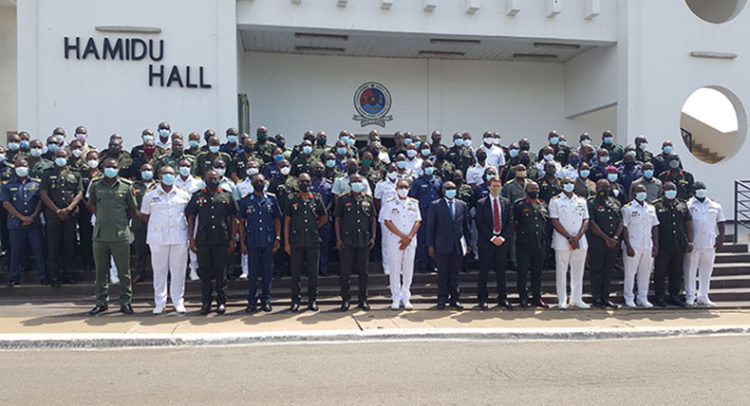Prof. Elvis Nyarko, Rear Admiral Moses Beick Baffour and other senior military officers in a group photograph with students of the Maritime Sector Governance Course
The Vice Chancellor of the Regional Maritime University, Professor Elvis K. Nyarko, has said maritime threats is dynamic and keep evolving every day.
He was of the view that policies to address these threats should therefore be “very appropriate and effective.”
“These policies should be developed, and filtered by highly trained men and women who are inspired and committed to the safety, security and advancement of our respective countries through the sustainable management of our maritime resources,” he said while addressing students of the Ghana Armed Forces Command and Staff College undertaking a course in Maritime Sector Governance.
The Exclusive Economic Zone (EEZ) Management Operation course has been running for the past 15 years and was recently reviewed to conform to current trends in the maritime sector.
Prof. Nyarko said the decision made last year to review the entire course reflect contemporary issues in the maritime sector.
“I therefore deem the change of name from the Exclusive Economic Zone to Maritime Sector Governance Course very appropriate as this encompasses every aspect of the maritime sector and not only the management of the exclusive economic zone,” he said.
He said in recent times, there has been the realisation of the vast potential that the sea and its related bodies contribute to economic development besides the traditional fishing and oil industries.
He indicated that most ‘Littoral States’ now have as an economic and security priority, management and operations in the maritime environment.
“It is therefore not surprising that these concerns have assumed centre state in the maritime security and economic management considerations of all these states.
“This is as a result of the enormous opportunity and challenges emanating from the recognition of the exclusive rights for the exploitation of the extensive sea areas which in the case of Ghana is approximately 64,000 Square nautical miles,” he revealed.
“Today, Littoral States have more growing needs to ensure accountability and oversight over their maritime domain, especially the Exclusive Economic Zone with regards to safety and security related activities,” Prof. Nyarko disclosed.
Prof. Nyarko pointed out that another significant issue was the realisation that sustainable management of maritime resources required collaboration across sectors among countries and on the scale that had not been previously achieved.
The Commandant of the college, Rear Admiral Moses Beick Baffour, in an interview, said the course which was previously referred to as the Exclusive Economic Zone Management Operations was relevant.
“The EEZ course was changed to conform with the new changes and this will give the course a broader scope to conform with contemporary times and also ensure that the course is in consonance with Ghana’s maritime strategy,” Rear Admiral Baffour disclosed.
The students, numbering 85, comprises 59 persons from the Ghana Armed Forces, 20 from other African countries, while six are from other Ghana maritime stakeholder institutions.
BY Linda Tenyah


